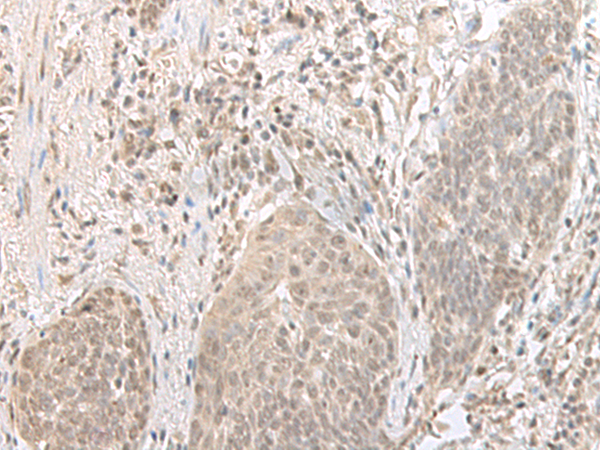
| WB | 咨询技术 | Human,Mouse,Rat |
| IF | 咨询技术 | Human,Mouse,Rat |
| IHC | 1/25-1/100 | Human,Mouse,Rat |
| ICC | 技术咨询 | Human,Mouse,Rat |
| FCM | 咨询技术 | Human,Mouse,Rat |
| Elisa | 1/5000-1/10000 | Human,Mouse,Rat |
| Aliases | ORC1L; PARC1; HSORC1 |
| Host/Isotype | Rabbit IgG |
| Antibody Type | Primary antibody |
| Storage | Store at 4°C short term. Aliquot and store at -20°C long term. Avoid freeze/thaw cycles. |
| Species Reactivity | Human, Mouse, Rat |
| Immunogen | Fusion protein of human ORC1 |
| Formulation | Purified antibody in PBS with 0.05% sodium azide and 50% glycerol. |
+ +
以下是3-4篇关于ORC1抗体的参考文献及其摘要内容的简要列举:
1. **文献名称**:*"ATP-dependent recognition of eukaryotic origins of DNA replication by a multiprotein complex"*
**作者**:Bell, S.P., Stillman, B.
**摘要**:该研究首次纯化并鉴定了酵母中的起源识别复合体(ORC),利用ORC1特异性抗体证实其结合到DNA复制起点,揭示了ORC1在复制起始中的关键作用。
2. **文献名称**:*"Regulation of the origin recognition complex in response to stress, during the cell cycle, and during development"*
**作者**:Takeda, D.Y., Dutta, A.
**摘要**:通过ORC1抗体进行免疫印迹和免疫沉淀实验,证明哺乳动物ORC1在细胞周期S期后通过泛素化降解,调控复制许可和基因组稳定性。
3. **文献名称**:*"ORC1 binds to cis elements of chromatin and promotes histone H4 acetylation for replication origin activation"*
**作者**:Hossain, M., Stillman, B.
**摘要**:结合ChIP-seq和ORC1抗体,发现ORC1通过识别特定染色质修饰(如H4K20me2)并招募组蛋白乙酰转移酶,促进复制起点的激活。
4. **文献名称**:*"Spatiotemporal coordination of DNA replication origin assembly in human cells"*
**作者**:Sasaki, T., Gilbert, D.M.
**摘要**:使用ORC1抗体进行免疫荧光和活细胞成像,揭示了ORC1在细胞核内的动态定位与复制起点时空协调组装的关系。
(注:以上文献为领域内代表性研究,实际引用需核对具体内容及发表信息。)
ORC1 (Origin Recognition Complex subunit 1) antibodies are essential tools for studying the molecular mechanisms of DNA replication initiation in eukaryotic cells. The ORC1 protein is a critical component of the Origin Recognition Complex (ORC), a six-subunit complex (ORC1-6) that binds to replication origins to initiate DNA synthesis during the cell cycle. ORC1 plays a central role in recruiting additional replication factors, such as CDC6 and the MCM helicase complex, ensuring proper licensing of replication origins during the G1 phase. Dysregulation of ORC1 function is linked to replication errors, genomic instability, and diseases like Meier-Gorlin syndrome, a primordial dwarfism disorder associated with mutations in ORC1.
ORC1 antibodies are widely used in research to investigate cell cycle regulation, DNA replication dynamics, and cancer biology. These antibodies are typically developed in hosts like rabbits or mice, targeting specific epitopes (e.g., N-terminal or C-terminal regions) of human ORC1. They enable techniques such as Western blotting, immunofluorescence, chromatin immunoprecipitation (ChIP), and flow cytometry to detect ORC1 expression, localization, and interactions. Commercial ORC1 antibodies are often validated for specificity using knockout cell lines or siRNA knockdowns. Researchers also utilize them to explore ORC1's role in development, stem cell biology, and diseases marked by replication stress, providing insights into therapeutic targets for cancer and genetic disorders.
×